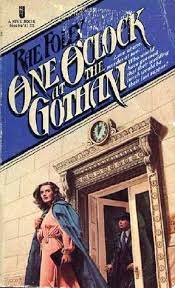It has been a couple of years since I have read anything by this author. To date I have reviewed Wake the Sleeping Wolf (1952) and Nightmare Honeymoon (1963), and today’s title unintentionally moves us into the next decade of Foley’s writing career, the 1970s. I should probably point out at this point that despite the mention of ‘Gotham’ this mystery isn’t linked to Batman!
Synopsis
‘He came out of nowhere to conquer the richest prize of the year, newly-minted heiress Janice Edwards who, even her best friends admitted, was no more fit to handle men than she was money. Only hours after their secret wedding the bride was asked to identify a middle-aged corpse who had fallen to his death from a hotel room window. “This isn’t my husband. I never saw him before.” But it was her husband. Who killed the groom?’
Overall Thoughts
From the setup as described above in the blurb for the Jove Books edition, I thought we were going to get a mystery in the manner of Craig Rice’s Having a Wonderful Crime (1943), which also sees a wedding partner bite the dust in record time after the ceremony. However, the blurb is a bit distortive, as it turns out that the groom is still alive and kicking for nearly a week after the wedding. He dashes off for a “work trip” straight after the ceremony and then has dinner with his new wife days later. It is shortly after this meal, at the Gotham, that he dies. Put like that, it does sound less dramatic, so perhaps that is why the blurb writer tweaked the facts.
The story begins by looking at Janice Edwards’ life when she was growing up, which despite the wealth (‘When Ransome cast his bread upon the waters, it came back toasted and spread with caviar – the best caviar’) was less than ideal given that both her mother and stepfather disliked her and for the most superficial of reasons:
‘There was only one drawback to this felicitous union: Mrs Ransome’s daughter by her first marriage. To a woman who had been hailed as a beauty from the time she was a toddler, it was a constant humiliation to have to acknowledge as her own child a tall, gawky girl with braces on her teeth, who had no charm and, besides, looked her full age, which was an affront in itself. Ransome had accepted this burden without complaint, and had dealt with the matter with his usual kind firmness. When he realised that nothing could be done to make Janice attractive and interesting to his friends, he felt no obligation to keep her with them. As calmly as he would have removed from his walls a painting whose authenticity was doubtful, he placed Janice in a succession of schools and summer camps until she was really too old to be kept there any longer.’
Given the grimness of this, it is surprising how well-adjusted Janice is as a young adult. But it might also be the reason she is a bit more vulnerable to picking a rubbish spouse.
The narrative is quite matter of fact in the way it describes how Janice is made an orphan, her parents dying in a plane crash. Despite her inheritance, Janice plans to keep her existing job at a one-man-band publishing firm. Her parents had not supported her choice of career:
“You can’t, after all, spend the rest of your life reading novels.”
“Why not?” she asked unexpectedly. “It’s what I really like.” It was, she reflected, the way she lived her real life.
“Trash,” he said scornfully. “Women’s fiction, Cinderella. Mere entertainment.”
“What’s so mere about entertainment? It makes life a lot more bearable. And it’s not just a woman’s escape. What do men like to read? A so-called adult version of an oversexed Jack the Giant Killer.”
I found this an interesting passage as I feel many a booklover can get behind Janice’s opening remark. I also wondered if Foley was using this brief moment to talk about perceptions of the differences in what men and women read. There is a feeling here of a negative bias against “women’s fiction”, with Janice’s stepfather, Carl, summing it up as all being like Cinderella – i.e. romantic fairytales. I don’t think Foley really challenges the stereotypes concerning “women’s fiction”, but she does at least even the playing field with a reductive impression of “men’s fiction”. She also defends the validity of novels as entertainment. How Foley talks about fiction here is interesting in light of her own writing, which in a way follows some variants of the typical fairy tale. Janice’s trajectory in this book is a case in point, as she has to make her way in the world and differentiate the honest from the dishonest, something she is not that good at.
After the introduction the narrative begins to narrow down its cast, with the main focus being on an artist’s colony (started by Carl Ransome) and the fraught relationships among its residents. There are also a couple of characters linked to Janice’s workplace including her boss. The blurb is not hugely flattering towards Janice. Yet it is arguably not that inaccurate. Her plans for her inheritance are not unreasonable, although very generous, but it is probably a rooky error to start telling your employer how much money you’re leaving them in your will. Her lawyers describe her as a ‘sitting duck’ and initially she is able to avoid getting too pushed around by those close to her, but ultimately, she does pick a horrendous spouse. His prompt death was probably a very good thing for her. However, I think Janice tends to be a conflict-avoider, causing further problems for herself later in the story. In particular she does not confront a woman who is adamant that Janice is engaged to her son (who was lost in Vietnam). Janice is quite happy to throw the responsibility of disillusionment upon the soldier if he returns, a man who is known for his love of easy living. The way this plot line develops is not quite what I expected, a bit more unusual, but I still found Janice’s passivity annoying.

From the very start the reader knows that Janice’s spouse Bob Maxwell is too good to be true and unlike Janice we are not surprised by the many reasons people might want to kill him. He is a truly awful person, even cheating on Janice the day before their secret wedding, in her own apartment! Some of the motives for the murder are easy for the reader to anticipate.
As the police investigation unfolds, Janice becomes more concerned with whether her boss is the murderer or not. The motives are all out in the open and there are so many poor alibis, but there is no way of narrowing down the list of suspects. An unplanned trap is naturally the way in which the solution is discovered, with our heroine finding herself in peril. There is a long explanation from the police afterwards, as there are many gaps in knowledge which need to be filled in. There is perhaps one clue pointing towards the killer, but it is not one which is going to stick in your mind. The choice of murderer is a good one, yet I think Foley’s writing a style lacks the depth of psychological characterisation which would have made the mystery a stronger read.
Rating: 3.5/5


Coincidentally I just recently, a few weeks ago, picked up a used copy of this. Although I read it in one sitting, I already seem to have forgotten most of the plot. It’s actually just while reading your review, that it occured to me, that this was sounding extremely familiar. My main issue with it was, that it lacked the atmosphere and as you write “the depth of psychological characterisation” to make it a stronger read.
LikeLiked by 1 person
That is serendipitous timing. I agree with you on the forget-ability of Foley’s work as I cannot remember much about the other two I have read.
LikeLiked by 1 person